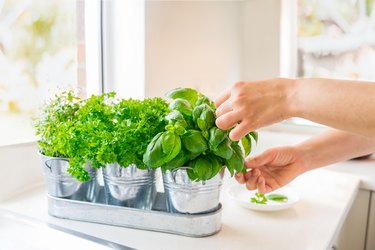
There are many rumors, myths and beliefs in circulation about the ideal best practices for growing plants; these can lead home gardeners into a confusing landscape of conflicting advice and ambiguity. One popular idea is that plants benefit from being fed with hot water, and that this causes them to grow taller and faster than they would otherwise. Let's examine the facts.
Warm or Cold Water for Plants
Video of the Day
The expansive diversity of the plant world makes it difficult, if not impossible, to set a single universal rule for the ideal water temperature for irrigating plants. However, it is well documented that hot water can cause damage to a plant's root systems and leaves. It can also kill beneficial microorganisms that the plants rely on in order to grow strong and healthy. Gardeners who have attempted to tend their plants with hot water have likely inadvertently harmed them.
Video of the Day
Although it's tempting to think that, because hot water damages plants, cold water will help them, water at the other temperature extreme can do just as much harm to plants. Using cold water on your plants can shock their systems by slowing or even stopping their growth entirely, if it doesn't kill them outright. Even at less extreme temperatures, excessively cool or warm water can still slow the internal processes that plants use to grow.
The vast majority of plants respond best to room temperature water, although exceptions do exist, as with any rule. Orchids are one species of plant that can benefit from the occasional ice cube, as the temperature fluctuation spurs the growth of new flowers.
When to Water Your Plants
The best time of day to water plants is subject to just as many opinions and misconceptions as the temperature of the water used to nourish them. While the effects of watering at different times throughout the day are not as varied or consequential as water temperature, they may still have a noticeable impact on how quickly and healthily your plants grow.
For example, watering plants during the hottest part of the day can be less efficient than watering during periods of the day that have cooler temperatures; heat evaporates water more quickly and therefore gives the plants less time to make use of it. Heat stress can also affect outdoor plants and prevent them from being able to make the most of the water they're given by slowing or impeding their biological processes.
The ideal time and temperature at which to water plants will, of course, vary based on the species of plant in question. Some, like cacti, are hardier and more resilient than others, and can therefore handle a bit more indelicacy in the manner in which they're cared for.
Watering Rules of Thumb
In general, the water used to feed plants should be kept around room temperature; ideally, use water anywhere between 60 degrees to 70 degrees Fahrenheit. However, 68 degrees Fahrenheit is the perfect temperature for most plants because it promotes oxygen uptake and root efficiency. Furthermore, the best time of day to water plants is typically in the morning.
Avoid watering most plants later in the day or at night. Letting the plants sit in wet or damp soil for too long can cause fungal infections, which may end up seriously harming or killing them.